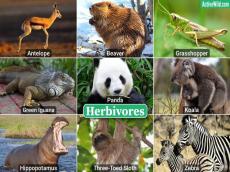|
|
TODAY.AZ / World news
Climate change threatens herbivorous animals
28 December 2024 [08:00] - TODAY.AZ

By Alimat Aliyeva
An international group of scientists has concluded that climate change is significantly reducing the nutritional value of plants, which could have serious consequences for animals that rely on plant-based food.
Plants serve as the primary food source for over a third of all animals on the planet. However, recent studies reveal that global warming is diminishing the nutritional content of plants, posing a growing threat to herbivorous species.
In a new study, researchers discovered that accelerated plant growth under conditions of high temperatures and elevated carbon dioxide levels often results in a decrease in the concentration of key nutrients. This phenomenon is especially troubling for herbivorous species, such as giant pandas, which depend on the nutritional quality of bamboo. Similarly, livestock like cattle, whose feed quality may decline due to these changes, could experience slower weight gain and overall health issues. In some cases, these shifts in plant nutrition may even impact the total population of certain species.
The effects of changing plant nutrition extend across ecosystems, from rainforests to oceans. Even marine ecosystems are affected, with seaweed losing vital nutrients that support marine life. Scientists warn that these long-term ecological shifts require careful study to fully understand their impact on biodiversity and the survival of various animal species.
As the global climate continues to change, these findings highlight the urgent need to address not only carbon emissions but also the broader ecological consequences that affect food chains worldwide.
URL: http://www.today.az/news/regions/256003.html
 Print version
Print version
Connect with us. Get latest news and updates.
See Also
- 16 January 2025 [03:53]
Israel and Hamas clinch deal on ceasefire after devastating 15-month onslaught - 15 January 2025 [23:32]
First edition of "Harry Potter" saved from landfill - 15 January 2025 [22:43]
Second stage of ADA University’s Idea Incubation Program launches - 15 January 2025 [22:17]
Joe Biden releases farewell letter - 15 January 2025 [21:18]
SpaceX launches Turkiye's first Baykar satellite - 15 January 2025 [20:19]
Embawood fines for environmental pollution - 15 January 2025 [19:40]
South Korea, United States and Japan hold joint military exercises - 15 January 2025 [19:25]
Flying cars may soon become reality - 15 January 2025 [18:45]
TikTok prepares to cease operations in the United States - 15 January 2025 [15:37]
Armenian Foreign Ministry summons Russian ambassador over TV program
Most Popular
 Biden's farewell gift to the Armenians
Biden's farewell gift to the Armenians
 Same Macro, same rake
Same Macro, same rake
 North Korea launches new missile towards Sea of Japan
North Korea launches new missile towards Sea of Japan
 Construction of 3rd railway between Kazakhstan and China begins
Construction of 3rd railway between Kazakhstan and China begins
 Technovation 2024: Bold move towards smoke-free future
Technovation 2024: Bold move towards smoke-free future
 Community condemns biased broadcast by German radio channel
Community condemns biased broadcast by German radio channel
 Azerbaijani press on path of sustainable development
Azerbaijani press on path of sustainable development
